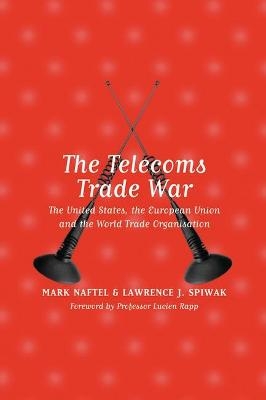
The Telecoms Trade War
Hart Publishing (Verlag)
978-1-84113-014-9 (ISBN)
If one were to believe the politicians and pundits in the trade press,the world is in midst of a "telecoms revolution," resulting from (the) deregulation and new competitive opportunities represented by the 1997 World Trade Organisation Agreement on Basic Telecommunications Services. This may be true. Unfortunately, however, the actions of many regulators and industry participants more accurately reveal not a telecoms "revolution" but instead a growing telecoms trade war that is dangerously close to spiralling out of hand. In this book, Naftel and Spiwak review U.S. and European competition and regulatory initiatives post-WTO and provide both a useful roadmap to today's U.S., EU and WTO telecoms regulation and an examination of various case studies to illustrate their points. In so doing, the authors discover unfortunately the sad reality that, despite the political rhetoric, regulators on both sides of the Atlantic have eschewed innovative and indeed productive solutions to create a market structure conducive to long-term competitive rivalry.
Instead, the authors demonstrate that current policies reveal a growing cynicism towards the maximisation of consumer welfare that will be difficult - if not outright impossible- to remove.
Mark Naftel is a telecommunications lawyer and Partner at Norton Rose Solicitors,London. He is also an Adjunct Fellow of the Phoenix Centre. Lawrence J Spiwak is the President of the Phoenix Center for Advanced Legal and Economic Public Policy Studies in Washington, DC. He is an internationally recognized authority on the legal and economic issues affecting telecommunications.
Part 1 Analytical and legal framework: telecoms policy for the new millennium - introduction, why regulation and trade policy just don't mix, the growing regulatory cynicism has no place in policy-making, so where do we go from here?, case study - the United States International Telecoms policy; why restructure? - why restructure?, identify optional long-term market structure, policymakers must seek to promote entry aggressively, the economics of entry - "the entry condition", aggressively promoting entry is the sine qua non of the entire exercise, so why are so many regulators really against new entry?; analytical framework - a time to change perspective, basic economic characteristics of dynamic versus static markets, importance of a dynamic perspective, case study - dynamic change and the need for the 1996 US Telecoms Act, understanding the role of government, defining the rhetoric - what do we mean, how should we move forward; evaluating competition in a post-WTO world - structural market conditions in the post-WTO world - generic analytical framework, potential conduct in the post-WTO world, market performance in the post-WTO world; the WTO and the reference paper - an ostensible blueprint for entry - introduction, a brief history of the WTO Telecoms Treaty and the GATS, WTO disputes and resolution procedure, WTO resolution - illustrative cases, the WTO Telecoms Treaty, the future of the WTO Telecoms Treaty. Part 2 US efforts to promote telecoms competition: international competitive carrier, the FCC's first attempts to control foreign carriers, the FCC's foreign carrier or "ECO" order, questions of dominance and effective competitive opportunities, who needs market power to apply ECO? the AP and APC PSC ECO orders, settlement rate disputes - the Telintar Trade War, summary and analysis; US policies post-WTO part 1 - benchmarks and entry fees - exactly how open are the US markets post-WTO?, the FCC's "Foreign Participation Order" (WTO Implementation Proceeding), summary and analysis; US policies post-WTO part 2 - the naked politicisation of the American legal system - Cable & Wireless decision, how politics now trumps law, economics and facts, so what's really going on here?,; "do as I say, not as I do" - US efforts at promoting local telecoms competition, introduction, bundling, incumbent reconcentration, line sharing, vertical re-integration, conclusion. Part 3 European efforts to promote telecoms competition: EU foundations, institutions and policies - introduction, the birth of a new kind of nation, EU institutions, law and policy, EU competition policy and the concept of dominance, conclusion; Europe's first steps towards telecoms competition - introduction, international traffic exchanges and the British Telecom judgement, the European Commission's Telecommunications Green Paper, the equipment directive and member state challenge, the services directive, ONP directives, one last directive, conclusion. (Part Contents).
| Erscheint lt. Verlag | 15.1.2001 |
|---|---|
| Verlagsort | Oxford |
| Sprache | englisch |
| Maße | 156 x 234 mm |
| Themenwelt | Recht / Steuern ► EU / Internationales Recht |
| Sozialwissenschaften ► Politik / Verwaltung ► Europäische / Internationale Politik | |
| ISBN-10 | 1-84113-014-1 / 1841130141 |
| ISBN-13 | 978-1-84113-014-9 / 9781841130149 |
| Zustand | Neuware |
| Haben Sie eine Frage zum Produkt? |
aus dem Bereich


